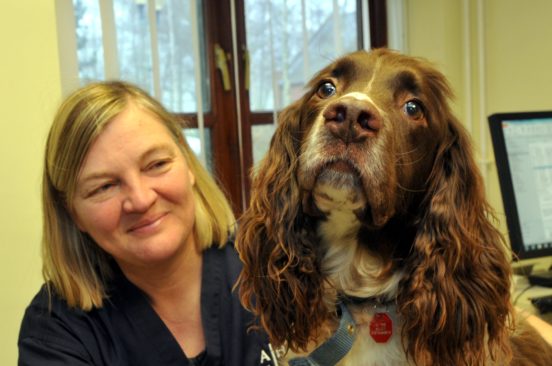Experiences of infectious disease outbreaks, such as Foot–and–Mouth disease in 2001, have prepared Edinburgh’s leading veterinary hospital to develop working strategies for emergency situations.
When the COVID-19 lockdown was imposed in Scotland, the Dick Vet Hospital for Small Animals rapidly reorganised their staff and workspace to comply with health guidelines. “We prioritise the safety of our staff, our clients, and endeavour to put the welfare and care of each and every animal at the top of our agenda,” says Dr Sue Murphy, the Hospital’s Director, a Veterinary Oncologist with speciality in small animals.
Those who could work from home, including receptionists and the account department, and those who needed to be at home, such as staff with young children, underlying health conditions or with transportation difficulties due to lockdown, were asked to do so.
Other clinical care staff were divided into three teams, to work on a rotating shift basis. Each team is on duty at the hospital for 24 hours, four days a week, followed by four days’ working from home and four days off duty. This pattern then repeats. Team membership is not altered, which keeps the risk of cross-contamination between teams to a minimum. Social distancing is also observed where possible in a clinical environment.
Clients who want to bring their animals to the Hospital have to make appointments by telephone or email. The Hospital provides as much remote care as is possible, so that their clients do not have to bring their animals in unless urgent medical attention is needed. Non-urgent cases can be triaged and if necessary, treatment deferred to enable prioritisation of emergency cases.
Animals requiring physical examination can be assessed in the car park area, as opposed to within the Hospital, enabling clients and staff to remain at a safe distance. Clients bringing sick animals to the Hospital are asked to stay in their cars where possible. If the animals are determined to be at risk, they are treated as priority cases. These considerations are made on a case-by-case basis. “Although they may not have an acute problem today, their health condition may deteriorate in the next few weeks, so we need to judge when it’s best to see them” says Dr Murphy.

Clients bringing animals to the facility are asked to strictly adhere to National Health Service (NHS) recommendations of handwashing before interacting with staff, and to maintain a distance of at least two metres. Since lockdown began in March 2020, there has been a substantial reduction in number of clients bringing their pets to the hospital or seeking telephone consultancy, says Dr Murphy.
The Hospital regularly reviews procedures in order to provide the highest possible protection to both humans and animals, with strict adherence to social distancing guidance. The Dick Vet recently resumed the offering of vaccinations to ‘at risk’ animals. At the moment, they are not offering routine booster vaccinations.
Some animals may also develop parasite–associated infections as a result of warmer weather. These ailments are not usually serious, and if lockdown continues, may be dealt with remotely, says Dr Murphy.
The Hospital’s services are offered to a range of small animals including cats and dogs and exotic animals such as rabbits, birds, reptiles, frogs, toads, snakes, turtles, fish and invertebrates. The veterinary school also has a practice dealing with farm animals including sheep, cows, an equine practice and referral equine hospital.
The Hospital provides a range of clinical services. It has a general practice, but also referral specialist services including anaesthesia; cardiopulmonary treatment affecting the heart and the lungs; dermatology to treat all forms of skin diseases; neurology and neurosurgery to treat a range of disorders of the nervous system; ophthalmology; and orthopaedic and soft tissue surgery. They use sophisticated diagnostic imaging technology to help diagnose illness, and offer comprehensive and advanced cancer treatments including surgery, chemotherapy, radiation therapy and palliative care.
Based on an interview led by Aphaluck Bhatiasevi, curator of the Covid-19 Perspectives blog and PhD candidate in Social Anthropology at the University of Edinburgh.
Dr Sue Murphy is Director of Clinical Services and Director of the Hospital for Small Animals.











Comments by Ritti Soncco